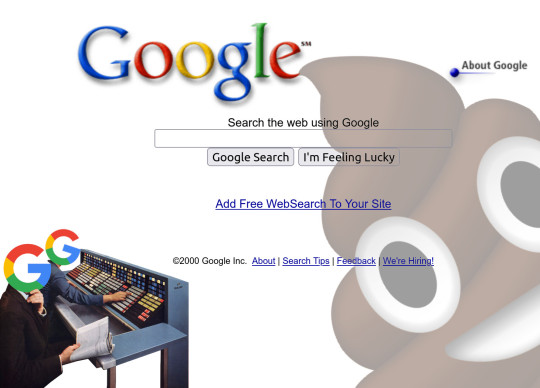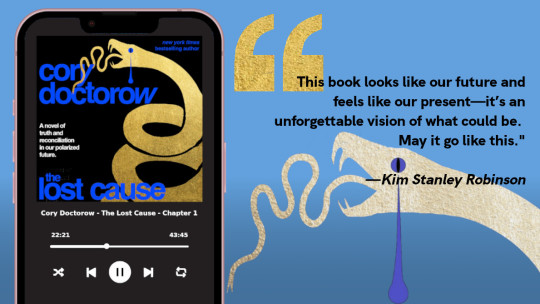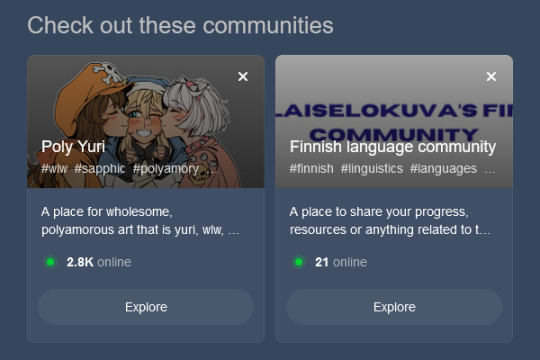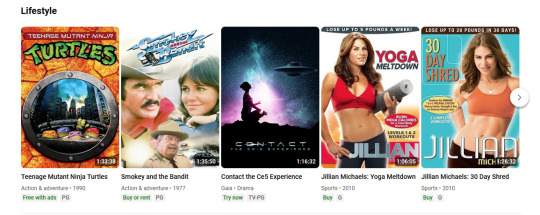#The algorithm
Explore tagged Tumblr posts
Text
I swear the Algorithm's decisions about what to try and sell me have become even less comprehensible ever since LLMs became the new hot thing. I just received two separate, apparently unconnected emails informing me there's been a price drop on helical cutter heads for DeWalt DW735 thickness planers.
1K notes
·
View notes
Text
Google’s enshittification memos

[Note, 9 October 2023: Google disputes the veracity of this claim, but has declined to provide the exhibits and testimony to support its claims. Read more about this here.]

When I think about how the old, good internet turned into the enshitternet, I imagine a series of small compromises, each seemingly reasonable at the time, each contributing to a cultural norm of making good things worse, and worse, and worse.
Think about Unity President Marc Whitten's nonpology for his company's disastrous rug-pull, in which they declared that everyone who had paid good money to use their tool to make a game would have to keep paying, every time someone downloaded that game:
The most fundamental thing that we’re trying to do is we’re building a sustainable business for Unity. And for us, that means that we do need to have a model that includes some sort of balancing change, including shared success.
https://www.wired.com/story/unity-walks-back-policies-lost-trust/
"Shared success" is code for, "If you use our tool to make money, we should make money too." This is bullshit. It's like saying, "We just want to find a way to share the success of the painters who use our brushes, so every time you sell a painting, we want to tax that sale." Or "Every time you sell a house, the company that made the hammer gets to wet its beak."
And note that they're not talking about shared risk here – no one at Unity is saying, "If you try to make a game with our tools and you lose a million bucks, we're on the hook for ten percent of your losses." This isn't partnership, it's extortion.
How did a company like Unity – which became a market leader by making a tool that understood the needs of game developers and filled them – turn into a protection racket? One bad decision at a time. One rationalization and then another. Slowly, and then all at once.
When I think about this enshittification curve, I often think of Google, a company that had its users' backs for years, which created a genuinely innovative search engine that worked so well it seemed like *magic, a company whose employees often had their pick of jobs, but chose the "don't be evil" gig because that mattered to them.
People make fun of that "don't be evil" motto, but if your key employees took the gig because they didn't want to be evil, and then you ask them to be evil, they might just quit. Hell, they might make a stink on the way out the door, too:
https://theintercept.com/2018/09/13/google-china-search-engine-employee-resigns/
Google is a company whose founders started out by publishing a scientific paper describing their search methodology, in which they said, "Oh, and by the way, ads will inevitably turn your search engine into a pile of shit, so we're gonna stay the fuck away from them":
http://infolab.stanford.edu/pub/papers/google.pdf
Those same founders retained a controlling interest in the company after it went IPO, explaining to investors that they were going to run the business without having their elbows jostled by shortsighted Wall Street assholes, so they could keep it from turning into a pile of shit:
https://abc.xyz/investor/founders-letters/ipo-letter/
And yet, it's turned into a pile of shit. Google search is so bad you might as well ask Jeeves. The company's big plan to fix it? Replace links to webpages with florid paragraphs of chatbot nonsense filled with a supremely confident lies:
https://pluralistic.net/2023/05/14/googles-ai-hype-circle/
How did the company get this bad? In part, this is the "curse of bigness." The company can't grow by attracting new users. When you have 90%+ of the market, there are no new customers to sign up. Hypothetically, they could grow by going into new lines of business, but Google is incapable of making a successful product in-house and also kills most of the products it buys from other, more innovative companies:
https://killedbygoogle.com/
Theoretically, the company could pursue new lines of business in-house, and indeed, the current leaders of companies like Amazon, Microsoft and Apple are all execs who figured out how to get the whole company to do something new, and were elevated to the CEO's office, making each one a billionaire and sealing their place in history.
It is for this very reason that any exec at a large firm who tries to make a business-wide improvement gets immediately and repeatedly knifed by all their colleagues, who correctly reason that if someone else becomes CEO, then they won't become CEO. Machiavelli was an optimist:
https://pluralistic.net/2023/07/28/microincentives-and-enshittification/
With no growth from new customers, and no growth from new businesses, "growth" has to come from squeezing workers (say, laying off 12,000 engineers after a stock buyback that would have paid their salaries for the next 27 years), or business customers (say, by colluding with Facebook to rig the ad market with the Jedi Blue conspiracy), or end-users.
Now, in theory, we might never know exactly what led to the enshittification of Google. In theory, all of compromises, debates and plots could be lost to history. But tech is not an oral culture, it's a written one, and techies write everything down and nothing is ever truly deleted.
Time and again, Big Tech tells on itself. Think of FTX's main conspirators all hanging out in a group chat called "Wirefraud." Amazon naming its program targeting weak, small publishers the "Gazelle Project" ("approach these small publishers the way a cheetah would pursue a sickly gazelle”). Amazon documenting the fact that users were unknowingly signing up for Prime and getting pissed; then figuring out how to reduce accidental signups, then deciding not to do it because it liked the money too much. Think of Zuck emailing his CFO in the middle of the night to defend his outsized offer to buy Instagram on the basis that users like Insta better and Facebook couldn't compete with them on quality.
It's like every Big Tech schemer has a folder on their desktop called "Mens Rea" filled with files like "Copy_of_Premeditated_Murder.docx":
https://doctorow.medium.com/big-tech-cant-stop-telling-on-itself-f7f0eb6d215a?sk=351f8a54ab8e02d7340620e5eec5024d
Right now, Google's on trial for its sins against antitrust law. It's a hard case to make. To secure a win, the prosecutors at the DoJ Antitrust Division are going to have to prove what was going on in Google execs' minds when the took the actions that led to the company's dominance. They're going to have to show that the company deliberately undertook to harm its users and customers.
Of course, it helps that Google put it all in writing.
Last week, there was a huge kerfuffile over the DoJ's practice of posting its exhibits from the trial to a website each night. This is a totally normal thing to do – a practice that dates back to the Microsoft antitrust trial. But Google pitched a tantrum over this and said that the docs the DoJ were posting would be turned into "clickbait." Which is another way of saying, "the public would find these documents very interesting, and they would be damning to us and our case":
https://www.bigtechontrial.com/p/secrecy-is-systemic
After initially deferring to Google, Judge Amit Mehta finally gave the Justice Department the greenlight to post the document. It's up. It's wild:
https://www.justice.gov/d9/2023-09/416692.pdf
The document is described as "notes for a course on communication" that Google VP for Finance Michael Roszak prepared. Roszak says he can't remember whether he ever gave the presentation, but insists that the remit for the course required him to tell students "things I didn't believe," and that's why the document is "full of hyperbole and exaggeration."
OK.
But here's what the document says: "search advertising is one of the world's greatest business models ever created…illicit businesses (cigarettes or drugs) could rival these economics…[W]e can mostly ignore the demand side…(users and queries) and only focus on the supply side of advertisers, ad formats and sales."
It goes on to say that this might be changing, and proposes a way to balance the interests of the search and ads teams, which are at odds, with search worrying that ads are pushing them to produce "unnatural search experiences to chase revenue."
"Unnatural search experiences to chase revenue" is a thinly veiled euphemism for the prophetic warnings in that 1998 Pagerank paper: "The goals of the advertising business model do not always correspond to providing quality search to users." Or, more plainly, "ads will turn our search engine into a pile of shit."
And, as Roszak writes, Google is "able to ignore one of the fundamental laws of economics…supply and demand." That is, the company has become so dominant and cemented its position so thoroughly as the default search engine across every platforms and system that even if it makes its search terrible to goose revenues, users won't leave. As Lily Tomlin put it on SNL: "We don't have to care, we're the phone company."
In the enshittification cycle, companies first lure in users with surpluses – like providing the best search results rather than the most profitable ones – with an eye to locking them in. In Google's case, that lock-in has multiple facets, but the big one is spending billions of dollars – enough to buy a whole Twitter, every single year – to be the default search everywhere.
Google doesn't buy its way to dominance because it has the very best search results and it wants to shield you from inferior competitors. The economically rational case for buying default position is that preventing competition is more profitable than succeeding by outperforming competitors. The best reason to buy the default everywhere is that it lets you lower quality without losing business. You can "ignore the demand side, and only focus on advertisers."
For a lot of people, the analysis stops here. "If you're not paying for the product, you're the product." Google locks in users and sells them to advertisers, who are their co-conspirators in a scheme to screw the rest of us.
But that's not right. For one thing, paying for a product doesn't mean you won't be the product. Apple charges a thousand bucks for an iPhone and then nonconsensually spies on every iOS user in order to target ads to them (and lies about it):
https://pluralistic.net/2022/11/14/luxury-surveillance/#liar-liar
John Deere charges six figures for its tractors, then runs a grift that blocks farmers from fixing their own machines, and then uses their control over repair to silence farmers who complain about it:
https://pluralistic.net/2022/05/31/dealers-choice/#be-a-shame-if-something-were-to-happen-to-it
Fair treatment from a corporation isn't a loyalty program that you earn by through sufficient spending. Companies that can sell you out, will sell you out, and then cry victim, insisting that they were only doing their fiduciary duty for their sacred shareholders. Companies are disciplined by fear of competition, regulation or – in the case of tech platforms – customers seizing the means of computation and installing ad-blockers, alternative clients, multiprotocol readers, etc:
https://doctorow.medium.com/an-audacious-plan-to-halt-the-internets-enshittification-and-throw-it-into-reverse-3cc01e7e4604?sk=85b3f5f7d051804521c3411711f0b554
Which is where the next stage of enshittification comes in: when the platform withdraws the surplus it had allocated to lure in – and then lock in – business customers (like advertisers) and reallocate it to the platform's shareholders.
For Google, there are several rackets that let it screw over advertisers as well as searchers (the advertisers are paying for the product, and they're also the product). Some of those rackets are well-known, like Jedi Blue, the market-rigging conspiracy that Google and Facebook colluded on:
https://en.wikipedia.org/wiki/Jedi_Blue
But thanks to the antitrust trial, we're learning about more of these. Megan Gray – ex-FTC, ex-DuckDuckGo – was in the courtroom last week when evidence was presented on Google execs' panic over a decline in "ad generating searches" and the sleazy gimmick they came up with to address it: manipulating the "semantic matching" on user queries:
https://www.wired.com/story/google-antitrust-lawsuit-search-results/
When you send a query to Google, it expands that query with terms that are similar – for example, if you search on "Weds" it might also search for "Wednesday." In the slides shown in the Google trial, we learned about another kind of semantic matching that Google performed, this one intended to turn your search results into "a twisted shopping mall you can’t escape."
Here's how that worked: when you ran a query like "children's clothing," Google secretly appended the brand name of a kids' clothing manufacturer to the query. This, in turn, triggered a ton of ads – because rival brands will have bought ads against their competitors' name (like Pepsi buying ads that are shown over queries for Coke).
Here we see surpluses being taken away from both end-users and business customers – that is, searchers and advertisers. For searchers, it doesn't matter how much you refine your query, you're still going to get crummy search results because there's an unkillable, hidden search term stuck to your query, like a piece of shit that Google keeps sticking to the sole of your shoe.
But for advertisers, this is also a scam. They're paying to be matched to users who search on a brand name, and you didn't search on that brand name. It's especially bad for the company whose name has been appended to your search, because Google has a protection racket where the company that matches your search has to pay extra in order to show up overtop of rivals who are worse matches. Both the matching company and those rivals have given Google a credit-card that Google gets to bill every time a user searches on the company's name, and Google is just running fraudulent charges through those cards.
And, of course, Google put this in writing. I mean, of course they did. As we learned from the documentary The Incredibles, supervillains can't stop themselves from monologuing, and in big, sprawling monopolists, these monologues have to transmitted electronically – and often indelibly – to far-flung co-cabalists.
As Gray points out, this is an incredibly blunt enshittification technique: "it hadn’t even occurred to me that Google just flat out deletes queries and replaces them with ones that monetize better." We don't know how long Google did this for or how frequently this bait-and-switch was deployed.
But if this is a blunt way of Google smashing its fist down on the scales that balance search quality against ad revenues, there's plenty of subtler ways the company could sneak a thumb on there. A Google exec at the trial rhapsodized about his company's "contract with the user" to deliver an "honest results policy," but given how bad Google search is these days, we're left to either believe he's lying or that Google sucks at search.
The paper trail offers a tantalizing look at how a company went from doing something that was so good it felt like a magic trick to being "able to ignore one of the fundamental laws of economics…supply and demand," able to "ignore the demand side…(users and queries) and only focus on the supply side of advertisers."
What's more, this is a system where everyone loses (except for Google): this isn't a grift run by Google and advertisers on users – it's a grift Google runs on everyone.

If you'd like an essay-formatted version of this post to read or share, here's a link to it on pluralistic.net, my surveillance-free, ad-free, tracker-free blog:
https://pluralistic.net/2023/10/03/not-feeling-lucky/#fundamental-laws-of-economics


My next novel is The Lost Cause, a hopeful novel of the climate emergency. Amazon won't sell the audiobook, so I made my own and I'm pre-selling it on Kickstarter!
#pluralistic#enshittification#semantic matching#google#antitrust#trustbusting#transparency#fatfingers#serp#the algorithm#telling on yourself
6K notes
·
View notes
Text
I have a real "i draw whatever the fuck i want" vibe that my followers HATE
joking but im just like "oh you followed me for gravity falls? thank you! anyway here's object show fanart gjinkas cause im really obsessed with this show atm
#hoodedjelly talks#i actually really love tumblr for this cause i really can draw and post whatever i want and not have to worry about#the algorithm#i want people to follow me for my art first out of anything#just hope me posting art of my fav thing that week keeps some people along while im trying to work on this show pilot with my friends
98 notes
·
View notes
Text

Artist making up terrible fictional song lyrics in under two minutes challenge.
39 notes
·
View notes
Text
Follow furry/therian artist. Social media suggests more. Follow more. Suggests more. The cycle continues. I'm not a furry... but...
59 notes
·
View notes
Text
Why am I getting people who unironically condone the Columbine sh**ting recommended to me under "Check out these blogs"?? This algorithm is screwed up. Just because I am interested in one specific crime from 160 years ago (Lincoln Assassination, which I DO NOT CONDONE, OBVIOUSLY, traitors d*e mad #theunionforever) does not mean I am one of THOSE true crime fans, let alone interested in true crime in general... I am literally an American History/Blood Meridian blog...
If you genuinely think taking innocent lives is in any way acceptable or refer to a mass m*rderer as your husband, even ironically tbh, I do not want you around me. I will not tell you what you should do to yourself, because I want to take the high road here. I would say you need help, but if you could afford help, let alone be receptive to it (to be helped, you must be willing), you would not be here doing this.
Anyone who responds in support will be blocked. I am not here to debate you, I am not here to send you resources, as you are clearly not receptive to help. I do not delude myself that this will be a wake-up call for anyone. My intent here is to be another dissenting voice as a palate cleanser, as a pin to the little bubble that one may live in where certain fringe ideas are normalized, to remind anyone to whom it may concern that this sort of "stanning" of a mass m*rderer is not remotely socially acceptable in the wider world.
May this be your reminder that this sort of behavior is unacceptable, and for good reason, though I do not deign to tell you why, as basic human decency is not something you can be convinced of, let alone logic. Take this to FetLife or something at least. (Not to diss FetLife, it is a very broad forum where hybristophilia or whatever this is may be more accepted in certain subgroups, of which it has many.)
#shooting mention#the algorithm#algorithm#tumblr algorithm#tcc columbine#dylan columbine#eric columbine#columbine 1999#columbine school shooting#school shooters#teeceecee#tccblr#tcc tumblr#tcc fandom#tc community#eric and dylan#eric 1999#tcc eric#tcc thoughts#tcc dylan#dylan 1999
22 notes
·
View notes
Text
Sister and I watched that kidfluencer/momager documentary on Netflix about "The Squad" and that poor Piper kid and it spent some time talking about how the views went up astronomically if the kids were "shipped" with each other, ie given pairing names, paired up depending on how it would most please the viewers, and coerced into being physically intimate for the camera.
I have to say? It gave me a little insight on why the younger crowd -- who are familiar with this sort of youtube channel and the content -- are as virulently skeeved by shipping as they are. They didn't come to the word in a fannish sense, talking about characters who aren't real. They saw their actual peers shoved into situations they didn't want to be in, by adults, for money.
#says miss maggie#shipping discourse#kidfluencers#media literacy#the algorithm#bad influence: the dark side of kidfluencing
15 notes
·
View notes
Text
*watches a few reaction videos of agatha all along*
youtube: k so what i´m hearing is you want ¨You´re in love with the Villain¨ playlists to clog up your feed. piano? techno? cyberpunk? catch em all. take a listen. go ahead. you´re clearly in love with the villain. click. i said CLICK. good girl.
#the algorithm#lmao#agatha all along#agatha harkness#agatha x rio#kathryn hahn#aubrey plaza#disney villains#true story
31 notes
·
View notes
Text
i have variable success with touching grass, but a longterm project of mine has been rewiring myself so that I'm able to function mostly unplugged, and it's given me THOUGHTS on advertising. Because it really makes you notice how advertisements are literally the most annoying shit on the planet.
The contrast between no algorithm=no ads practically ever and algorithm=CONSTANTLY being pitched to honestly makes me think that a lot of the stress in social media (it's proven to be bad for your mental health in large doses-- you can look up studies if you want, but people are more stressed on social media than not) is generated by a complete lack of control of the personal environment.
Like, I live in a city. I understand noise, loud people, and not being able to control every aspect of your space. When I am scrolling insta or reddit though, I have to be CONSTANTLY on guard to not click on a fucking ad. They can come from anywhere. At any time. It's stark when you try to get away from ads in other places, too. When I go from MY space, where I can put on soft music from a CD with no ads, do an activity with no ads, and hang out with people where we don't talk about buying jack -- a space where I have control over the soundscape and, to some extent, the topic of conversation-- to someone ELSE'S space, where there are ads on the tv, the radio, and the reels they're playing out loud, every ad starts to feel very much like there's a loud annoying man in the corner of your social gathering howling LOOK AT ME LOOK AT ME! GIVE ME MONEY HAHA IM FUNNY LOOK AT ME! MONEYYYYYY!!!! and somehow nobody cares? "Oh that ad is so stupid" my father in law says, thus allowing the loud yelling man to control the topic of conversation. On a DVD or CD book or magazine I have control, can skip around at my leisure. You jump around on youtube? Amazon? Hulu? "your media will return after this break!!!! BUY ME!!!" Like hello? You obnoxious fuck? This is my space. Oh I can pay 2x as much as I already pay you to shut this guy up? Extortion. Protection money on my peace of mind. Fucking die.
30 notes
·
View notes
Text
Today the thing Facebook wants to show me the most is "memes for men who are triggered by women having body modifications" so it's been a lot of "eww, girls with tattoos!!" kind of stuff, but this one cracked me up by including GLASSES. Fellas is it a red flag if a bitch can't see.

13 notes
·
View notes
Text
Sorry, I'm not supposed to have Feelings™ that aren't marketable. The algorithm doesn't like it.
#shitpost#shitposting#the algorithm#the internet#this is mostly a dig a Facebook#who admits to demonetizing and or shadowbanning creators#for not being Uplifting™ and Positive™ enough
23 notes
·
View notes
Text

Just throwing darts at this point, huh?
2K notes
·
View notes
Text

Youtube has an odd idea of what "lifestyle" is.
Or else I do.
Either way, I don't know what this insinuates.
17 notes
·
View notes
Text
7 notes
·
View notes
Text
I think Tumblr had one of the best "For You" algorithms. Then it launched communities, and now it daily recommends a community about bread.
I'm prediabetic!!
5 notes
·
View notes